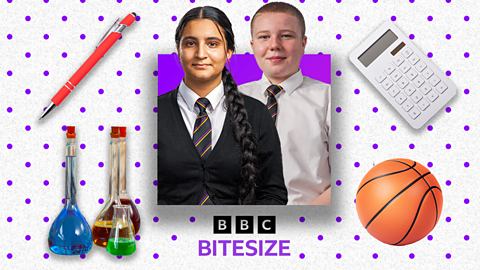
If your child is choosing their GCSE Options this year, or their Nationals if you’re in Scotland, you might be wondering how best to support them through the process.
You'll both have lots of questions about what their choices mean for both the immediate and the more distant future. Here, from Bitesize Study Support, are five things you and your child can think about as they prepare to make their choices.
1. When do students choose their options and what are the rules around what they can choose?

In England and Wales, students usually take their GCSEs in Year 10 and 11, so they'll need to choose the subjects they want to study for GCSE in Year 9 – but in some schools this might happen in Year 8. In Northern Ireland, students choose their options in Year 9 or 10 and in Scotland it’s S3 or earlier.
Different schools will ask students to pick their GCSE options at different times, but students will get plenty of notice and information from their teachers.
In most schools, there will be some subjects which are compulsory and some which are optional. The rules around this varies depending on where you are in the UK and some schools may make additional subjects compulsory, so do check with your child’s school to find out which subjects are available and what the rules are.
You can find videos and articles on the rules across the Nations here:
Everything you need to know about choosing your GCSE subjects in England
GCSEs in Northern Ireland: What are my options?
2. What support and guidance is available?
There is plenty of support out there, so do encourage your child to do their research and don’t be afraid to ask questions. Some schools will offer an options evening where you and your child can chat to the teachers about each subject. They can learn about what they’ll study, the coursework, the homework and the final exam. It’s a great place to start to find out about what options are available. At these events, your child can usually also speak to students already studying towards their exams in different subjects – they can have some great advice and tips, but do encourage your child to make their own decisions.
Another way to find out more about some of the subjects on offer is to take a look at The Ultimate Options Guide on BBC Bitesize Study Support. It’s like a virtual options evening in your pocket, where you can hear teachers and students talking about different subjects, check out relevant curriculum resources, and explore the kinds of jobs different subjects can lead to.
A lot of schools also have a careers adviser – they can give advice and talk your child through different options they might want to explore. If there isn’t a careers advisor at your child’s school, they may also be able to speak to their form tutor or pastoral support tutor and there are some great websites like the National Careers Service, My World of Work in Scotland, Careers Wales and The Careers Service in Northern Ireland, or you could check if your local authority has a careers service. You could also try BBC Bitesize Careers to see profiles of hundreds of jobs and advice on how to get into them. Taking careers advice could help your child decide which options may be best suited for the type of job they want to do in the future.

3. What are the best subjects to choose?
This is a very personal choice and the most important thing is that your child chooses the subjects that are right for them. Some may already know what they want to do in the future – if they want to go to a specific college, or do a particular course after their GCSEs or Nationals, for example, they can go onto the college website and look at what subjects they need to have at GCSE or National level. If they’re not sure what they want to do, they can use some of the routes above for finding advice about how best to keep their options open.
It’s important for your child to think about what motivates them and what they love doing. They could also benefit from thinking about their strengths and you and their teachers can help them with this. Some subjects are more coursework-heavy than others, some lean more towards writing and some more towards practical work. It's a good idea to learn as much as possible about the course content of the subjects your child is interested in and to find out how they’re taught and assessed, as some courses may be more suited to their strengths and interests than others. If you ask the school which exam board they’re using for different subjects, you can then see the full course specification on the exam board website. In The Ultimate Options Guide, you can hear students and teachers talking about some of the subjects on offer, find links to relevant curriculum resources and links to jobs that use those subjects.

4. What not to do when choosing your options
The best thing your child can do when it comes to choosing their options is to think about what’s right for them, what motivates and inspires them and what they’ll enjoy spending the next two years studying. It’s not a good idea for your child to choose a subject just because they like the teacher that has taught it so far – they may have a different teacher when it comes to their exam years. It’s also not a good idea to choose a subject just because their friends are also choosing it – everyone’s different and what suits one person may not suit another.
To hear some students’ thoughts on this, check out What NOT to do when choosing your GCSE or Nationals options.
5. What if my child doesn’t like their options once they’ve chosen them?
The subjects your child chooses will dictate their timetable. If they feel they’ve made a mistake with their choices, they should let the school know. They may be able to change subjects, but for timetabling reasons that might not always be possible. The best thing you and your child can do is take the time to research in advance everything they need to know about the different subjects at this level – how they’re taught, what they cover, how they’re assessed, and where they can lead. There’s a wealth of support out there, so do find out everything you can and don’t be afraid to ask questions!

Choosing your options 2025
A one-stop shop for support with choosing your GCSE or National Qualifications.

The Ultimate Options Guide 2025
Find out more about some of the subjects that may be on offer when choosing your GCSE or National options.

Top tips on choosing the best GCSE or National options for you
Some top tips to consider when looking at what the best GCSE or National options are for you.
